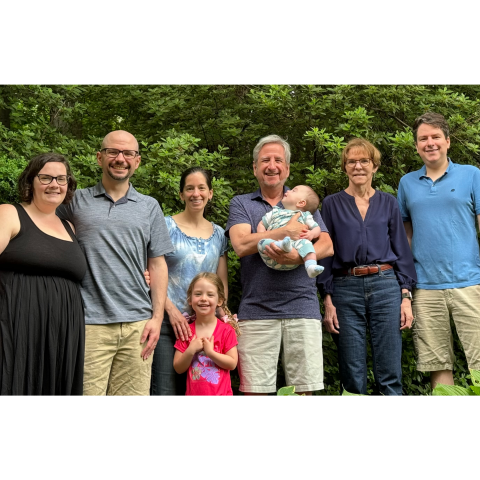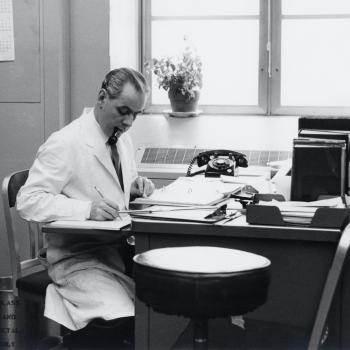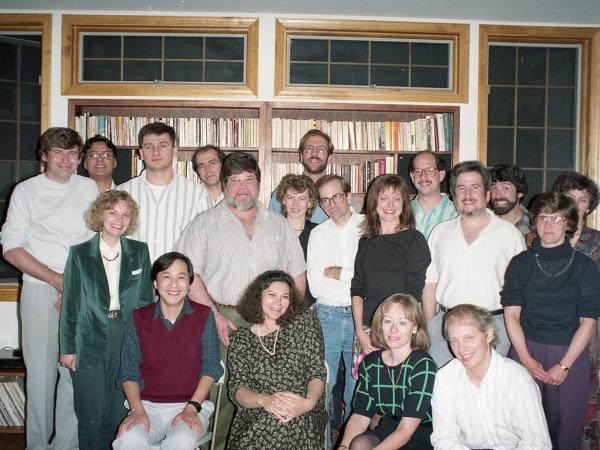
Dr. Ashwell with his family over Memorial Day weekend, 2024. Photo provided by Dr. Jonathan Ashwell.
For nearly four decades at NCI, Jonathan D. Ashwell, M.D., has worked to understand the mechanisms and consequences of intracellular signaling, primarily in T cells, and how these contribute to disease. Now, the Chief of the Laboratory of Immune Cell Biology has announced his retirement.
Ashwell received his A.B. in Chemistry from Colgate University in 1974 and went on to receive his M.D. from the College of Physicians and Surgeons at Columbia University in 1978; he then completed a three-year medical residency at New York Columbia-Presbyterian Hospital. His professional journey at the NIH began as a medical staff fellow in the Laboratory of Immunology at the National Institute of Allergy and Infectious Diseases (NIAID) in 1981 before transitioning into a senior staff fellow position in the NCI’s Biological Response Modifiers Program (BRMP) in 1985. Ashwell became a senior investigator in the same program in 1987, where he remained until he became the chief of his current branch in 1992.
However, Ashwell notes that his roots at the NIH run deeper than expected. An appreciation for scientific discovery and intellectual freedom was instilled in him by his father, Dr. Gilbert Ashwell, a National Academy of Sciences member and former NIH researcher.
“I used to come here on the weekends and spend time in the lab. My father would do experiments, use Bunsen burners and that kind of thing. Bringing a child into a lab would be frowned upon these days, but it was a different era back then,” Ashwell said. “I never thought I would end up at the NIH, but when I had the opportunity, I grabbed it.”
Ashwell’s first discovery as a Principal Investigator at NCI was establishing that the activation of T-cell hybridomas via the T-cell antigen receptor leads to the arrest of the cell cycle and subsequent cell death.
He also made the key discovery that T cells have a unique mechanism of activating the p38 MAP kinase, an alternative signaling pathway that is important in autoimmunity, inflammation and cancer development, downstream of T-cell antigen receptor (TCR) stimulation. From this finding, Ashwell and his team have worked to develop reagents that interfere with this pathway, and they found that this intervention can slow the growth of oncogene-induced pancreatic cancer. They hope this finding may help develop treatments for a multitude of illnesses.
Ashwell was also interested in the field of endocrinology as a medical student. His research included the discovery that the thymus produces glucocorticoids that are necessary for an immune system that is tolerant to self-generated antigens but aggressively responds to foreign antigens, and that tumors can evade immune responses by regenerating immunosuppressive glucocorticoids from inactive metabolites.
Additional basic research advances include the determination that inhibitors of apoptosis (IAPs) are ubiquitin protein ligases and that the regulatory subunit of the kinase IKK, known as NEMO, mediates its effects by binding linear and K63-linked ubiquitin chains.
"The time Jon and I spent together in the Laboratory of Immunology was remarkable,” said Lawrence Samelson, M.D., Chief of the Laboratory of Cellular and Molecular Biology and a longtime colleague. “He always works in research areas that are not heavily populated, but he makes great contributions that are unexpected.”
Throughout his career, Ashwell served on multiple intramural committees, including the NCI Intramural Advisory Board and the NIH Central Tenure Committee. Externally, he also spent time as a lecturer on cell biology at Georgetown University and the role of Deputy Editor for the Journal of Immunology. He is also the recipient of an NIH Merit Award, NCI Director’s Merit Award and an NCI Intramural Research Award.
In the following Q&A, Ashwell reflects on his career and looks forward to the next chapters of both cancer research and his endeavors:
What has been the most surprising thing you have learned in your career journey?
I’ve learned so much I never expected. One thing is that much of what we as scientists "know" is wide off the mark, if not completely wrong. The point is that one should be respectful of prevailing paradigms, but skeptical about certainty. Some of the most important field-altering discoveries come from getting the "wrong" answer and asking why.
What scientific achievement are you most proud of?
One of the things I am most proud of is that over the years our lab has not been self-circumscribed but wandered into many areas tangential or even unrelated to the current focus. The projects went where the science took them. For example, in the early 1990s, we found that stimulation of T-cell hybridomas with antigen or glucocorticoids resulted in apoptotic death, but when the stimuli were given together, the cells survived. We wondered if this "mutual antagonism" could be a mechanism for antigen-specific thymocyte selection, a process in which useless and autoreactive T cell precursors in the thymus undergo apoptosis but those that are potentially useful survive. For this model to work, the thymus itself would have to synthesize glucocorticoids.
Knowing little about the field of steroid biology at the time, we didn't realize that extra-adrenal glucocorticoid synthesis had not been described, so we naively performed experiments to test the possibility. We found that the thymus indeed produces glucocorticoids de novo and that they act in a paracrine fashion to ensure a healthy immune repertoire.
Last year, we finally identified the specific thymic cell subset that produces glucocorticoids and characterized how the process is transcriptionally regulated. Being able to “close the loop” by providing detailed mechanistic bases for an important biological process discovered in the lab so long ago is one of the more satisfying projects we have been a part of.
What do you see as some of the exciting frontiers in cancer research?
I think all research will be revolutionized by the application of AI machine learning, which allows computers to consume huge datasets and find obscure or cryptic relationships and dependencies. We're already seeing evidence of this, especially in non-directed research seeking to find correlations between tissue-specific or even single-cell expressed genomes and empirically derived observational data. I wouldn't be surprised if sophisticated machine learning models will soon be widely used in hypothesis-driven research as well.
Do you have any advice for those who are starting their career here in CCR?
If I could give only a single bit of advice it would be to pursue research they find fulfilling. Things such as position, compensation and other expediencies are important, but if one has the option, I think a major ingredient in a successful and satisfying career is that one is excited by the work. They should also follow their intellectual curiosity and not be technique- or field-limited. The NIH is a very collaborative environment, with enormous resources and many people with expertise in almost any field. Take advantage of it.
What are you most looking forward to in retirement?
I will be an NIH Scientist Emeritus and will continue to be involved in a research project begun in my lab. Outside of science, I am also a programmer and will continue to develop a popular Mac app that I initially wrote in 1982 during my postdoctoral fellowship.
Dr. Jonathan Ashwell retired from CCR on June 30, 2024, but remains as an NIH Scientist Emeritus.

